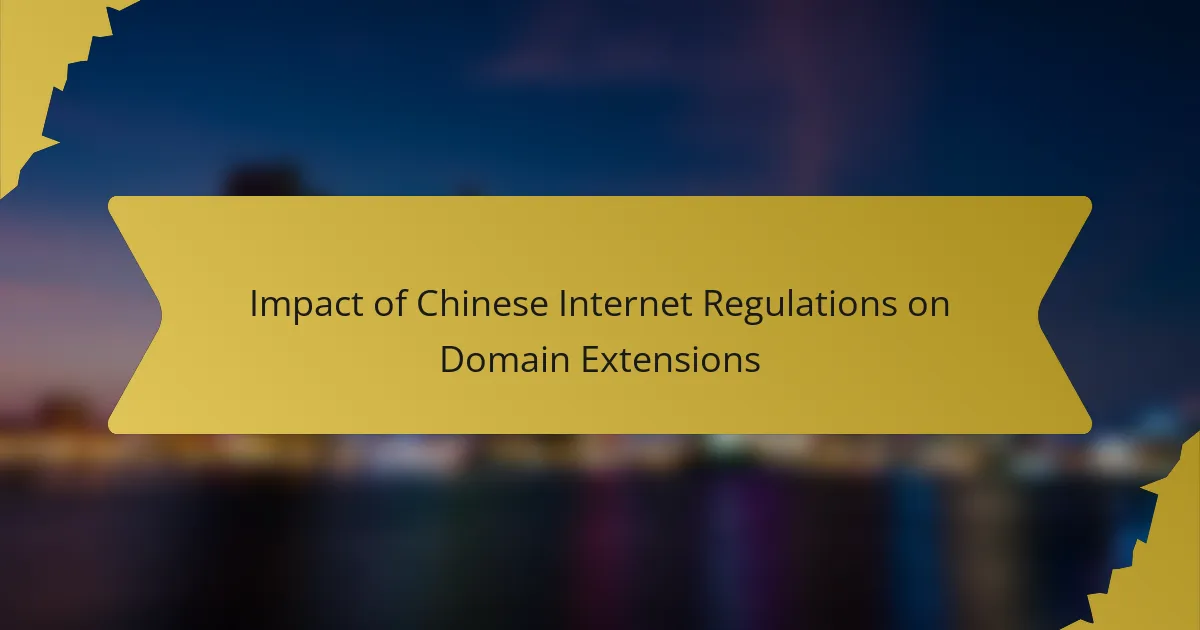Chinese Internet regulations impose significant restrictions on the use of foreign domain extensions, which profoundly affects how businesses operate online. These rules necessitate compliance with local requirements, influencing the choice of domain extensions such as .cn and impacting registration processes and content management for companies targeting the Chinese market.

How do Chinese Internet regulations affect domain extensions?
Chinese Internet regulations significantly restrict the use of foreign domain extensions, impacting how businesses operate online. These regulations shape the domain landscape, compelling companies to adapt to local requirements and consumer behavior.
Restrictions on foreign domain extensions
China imposes strict regulations on foreign domain extensions, limiting their availability for local businesses. Many companies find it challenging to register domains with extensions like .com or .net, as they often must use .cn or other approved local domains to comply with government policies.
These restrictions can lead to a fragmented online presence for businesses that wish to operate in China. Companies may need to establish a local entity to secure a .cn domain, which adds complexity and costs to their operations.
Impact on local businesses
Local businesses face increased competition from foreign companies that comply with Chinese regulations. This often results in a preference for local domain extensions, as consumers may trust .cn domains more than foreign alternatives.
Additionally, the need for compliance can strain resources for small and medium enterprises (SMEs), which may lack the expertise to navigate the regulatory landscape effectively. As a result, many SMEs opt for local domain registrations to avoid potential penalties.
Changes in user behavior
Chinese Internet regulations have influenced user behavior, with consumers increasingly favoring local domain extensions. Users often perceive .cn domains as more reliable and secure, which can affect their purchasing decisions.
Moreover, the restrictions on foreign domains can lead to a rise in local content consumption, as users are more likely to engage with websites that have a familiar and trusted domain extension. This shift emphasizes the importance of localizing online strategies for businesses aiming to succeed in the Chinese market.

What are the main types of domain extensions impacted?
The main types of domain extensions impacted by Chinese internet regulations include country-specific domains like .cn, as well as widely used generic domains such as .com and .net. These regulations affect registration processes, content restrictions, and operational compliance for businesses and individuals operating in or targeting the Chinese market.
.cn domain extension
The .cn domain extension is specifically designated for China and is subject to stringent regulations imposed by the Chinese government. To register a .cn domain, applicants must provide valid identification and comply with local laws, which may include content censorship and data localization requirements.
Businesses targeting Chinese consumers should prioritize obtaining a .cn domain to enhance credibility and visibility within the local market. However, they must ensure compliance with the Chinese Internet Content Provider (ICP) license requirements to avoid penalties or domain suspension.
.com domain extension
The .com domain extension is globally recognized and widely used, but its registration and use can be affected by Chinese regulations if the website targets users in China. While .com domains do not require local registration, content hosted on these domains must still adhere to Chinese laws, which can lead to potential blocking or filtering by the Great Firewall.
For businesses, using a .com domain can be beneficial for international reach, but they should consider hosting their content on servers located in China or partnering with local providers to improve access and compliance. Regular monitoring of content for adherence to Chinese regulations is crucial.
.net domain extension
Companies using a .net domain should be proactive in ensuring their content complies with Chinese laws. This may involve regular audits and adjustments to content to avoid censorship issues. Additionally, establishing a local presence can facilitate better compliance and accessibility for Chinese users.

What strategies can businesses adopt to comply with regulations?
Businesses can adopt several strategies to comply with Chinese internet regulations, focusing on local domain registration, utilizing VPNs, and ensuring content aligns with local standards. These approaches help navigate the complex regulatory landscape while maintaining online presence and accessibility.
Utilizing local domain registrars
Using local domain registrars is crucial for businesses aiming to operate within China. These registrars are familiar with the specific regulations and requirements, ensuring that domain registrations comply with local laws. For instance, businesses must provide valid identification and adhere to the Chinese Ministry of Industry and Information Technology (MIIT) guidelines.
Additionally, local registrars often offer services that facilitate compliance, such as hosting and maintenance that meet local standards. This can help avoid potential penalties or domain suspensions due to regulatory violations.
Implementing VPN solutions
Implementing VPN solutions can help businesses access the global internet while complying with local regulations. VPNs can provide secure connections and allow companies to manage their online presence without facing restrictions imposed by the Great Firewall. However, it’s essential to choose reputable VPN providers that comply with Chinese laws to avoid legal issues.
While VPNs can enhance privacy and security, businesses should be aware that the use of unauthorized VPNs may lead to penalties. Therefore, it’s advisable to regularly review the legal landscape and ensure that any VPN solution used is compliant with local regulations.
Adapting content to local standards
Adapting content to meet local standards is vital for businesses operating in China. This includes ensuring that all materials are culturally relevant and comply with local laws regarding censorship and content restrictions. For example, content that is politically sensitive or offensive may lead to removal or blocking.
Businesses should also consider language localization, not just translation, to resonate with the local audience. Engaging local experts can provide insights into cultural nuances and regulatory requirements, helping to create content that aligns with both user expectations and legal standards.

How do regulations vary across different regions in China?
Regulations governing internet usage and domain extensions in China differ significantly between urban and rural areas. These variations often reflect the level of economic development, technological infrastructure, and local governance.
Differences in Tier 1 cities
In Tier 1 cities like Beijing, Shanghai, Guangzhou, and Shenzhen, internet regulations are more stringent and closely monitored. These cities often have advanced technological capabilities, leading to more robust enforcement of rules regarding domain registration and usage.
For example, businesses in Tier 1 cities must comply with strict requirements for domain name registration, including the need for local business licenses and compliance with the Cybersecurity Law. This can result in longer processing times and higher costs for obtaining a domain.
Regulations in rural areas
Rural areas in China face less stringent internet regulations compared to Tier 1 cities. While there are still rules in place, enforcement may be more relaxed due to limited resources and lower internet penetration rates.
In these regions, local businesses may find it easier to register domains without the same level of scrutiny. However, they may also encounter challenges such as limited access to reliable internet services and fewer resources for compliance with existing regulations.

What are the implications for international businesses?
International businesses face significant implications due to Chinese internet regulations, particularly regarding domain extensions. These regulations can restrict access to the Chinese market and complicate online operations for foreign companies.
Challenges in accessing the Chinese market
Accessing the Chinese market presents various challenges for international businesses, primarily due to strict internet regulations and censorship. Companies may find that their websites are blocked or slow to load, impacting user experience and engagement.
Additionally, the requirement for local domain extensions, such as .cn, can create barriers for foreign entities. Without a local presence or compliance with regulations, businesses may struggle to reach Chinese consumers effectively.
Need for local partnerships
Establishing local partnerships is crucial for international businesses aiming to navigate the complexities of the Chinese market. Collaborating with local firms can provide valuable insights into regulatory compliance and consumer behavior.
Moreover, local partners can assist in obtaining necessary licenses and navigating the bureaucratic landscape, which can be daunting for foreign companies. This approach not only enhances market entry strategies but also fosters trust with Chinese consumers.

How can businesses measure the impact of these regulations?
Businesses can measure the impact of Chinese internet regulations by analyzing changes in website traffic and user engagement metrics. These metrics provide insights into how regulations affect online visibility and user behavior, allowing companies to adjust their strategies accordingly.
Tracking website traffic changes
To track website traffic changes, businesses should use analytics tools to monitor visitor numbers, page views, and bounce rates before and after the implementation of regulations. A significant drop in traffic may indicate that the regulations are hindering access or visibility within China.
Consider setting benchmarks based on historical data to identify trends. For instance, if traffic decreases by more than 20% over a month, it may signal a need for strategic adjustments, such as optimizing for local search engines or enhancing content relevance.
Analyzing user engagement metrics
User engagement metrics, such as average session duration, pages per session, and conversion rates, can reveal how regulations impact user interaction with a website. A decline in these metrics might suggest that users are finding it harder to navigate or engage with content due to regulatory barriers.
Regularly review these metrics to spot patterns. For example, if the average session duration drops significantly, it may be worthwhile to investigate potential content accessibility issues or to enhance user experience features tailored to the local audience.

What are the future trends in Chinese Internet regulations?
Future trends in Chinese Internet regulations are likely to focus on stricter enforcement of data privacy and security measures. As the government seeks to enhance control over digital spaces, businesses must adapt to evolving compliance requirements to avoid penalties.
Emerging regulations on data privacy
Emerging regulations on data privacy in China are becoming increasingly stringent, reflecting global trends towards enhanced user protection. The Personal Information Protection Law (PIPL), effective since 2021, sets out clear guidelines for how personal data must be collected, stored, and processed by organizations operating in China.
Businesses must ensure they have robust data management practices in place, including obtaining explicit consent from users before collecting their information. Companies should regularly audit their data handling processes to align with the PIPL’s requirements, which may involve appointing a data protection officer and implementing data breach response protocols.
To navigate these regulations effectively, organizations should stay informed about updates and changes in the legal landscape. Engaging with legal experts familiar with Chinese regulations can help mitigate risks and ensure compliance, ultimately fostering trust with users and stakeholders.
